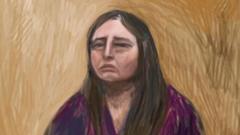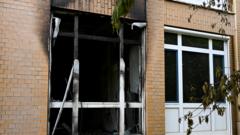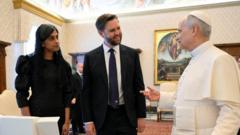The Vatican reported that Pope Francis, at 88 years old, is receiving treatment for bilateral pneumonia, where both lungs are affected. According to health experts, this condition can present significant risks, especially for older adults.
Pope Francis Hospitalized with Bilateral Pneumonia: Health Risks Highlighted

Pope Francis Hospitalized with Bilateral Pneumonia: Health Risks Highlighted
Pope Francis's hospitalization due to bilateral pneumonia underscores the seriousness of respiratory infections, particularly in elderly patients.
Pope Francis remains in the hospital following the Vatican's announcement that he has bilateral pneumonia, an infection affecting both lungs. Dr. James Musser, director at Houston Methodist Research Institute, explained that pneumonia involves inflammation in the lungs, often triggered by infections leading to symptoms such as fever and cough.
Typical diagnostic methods include listening to the patient's breath sounds, where abnormal sounds can indicate pneumonia. In younger individuals, pneumonia often resolves adequately with home care, but complications can be severe for those over 85 years old—an age bracket the Pope currently falls into.
Dr. Peter Chin-Hong from the University of California, San Francisco, noted that Streptococcus pneumoniae is the leading cause of this type of infection, which can lead to serious complications like sepsis if it spreads. While antibiotics can be effective, the presence of bacteria can be dangerous if they migrate from the lungs to the bloodstream.
Moreover, other viral and bacterial agents can cause bilateral pneumonia, and while vaccines may decrease risks associated with certain bacteria, they do not guarantee prevention. Dr. Paul Pottinger from the University of Washington characterized the Pope's situation as alarming, emphasizing the serious implications of bilateral pneumonia in elderly patients.
As updates from the Vatican are awaited, the medical community continues to monitor the health of Pope Francis, given the inherent risks associated with his age and current condition.
Typical diagnostic methods include listening to the patient's breath sounds, where abnormal sounds can indicate pneumonia. In younger individuals, pneumonia often resolves adequately with home care, but complications can be severe for those over 85 years old—an age bracket the Pope currently falls into.
Dr. Peter Chin-Hong from the University of California, San Francisco, noted that Streptococcus pneumoniae is the leading cause of this type of infection, which can lead to serious complications like sepsis if it spreads. While antibiotics can be effective, the presence of bacteria can be dangerous if they migrate from the lungs to the bloodstream.
Moreover, other viral and bacterial agents can cause bilateral pneumonia, and while vaccines may decrease risks associated with certain bacteria, they do not guarantee prevention. Dr. Paul Pottinger from the University of Washington characterized the Pope's situation as alarming, emphasizing the serious implications of bilateral pneumonia in elderly patients.
As updates from the Vatican are awaited, the medical community continues to monitor the health of Pope Francis, given the inherent risks associated with his age and current condition.





















